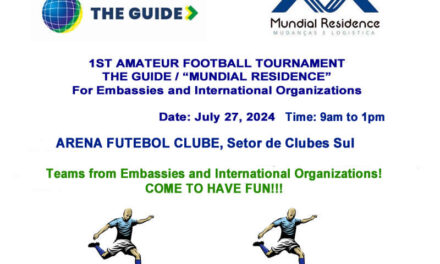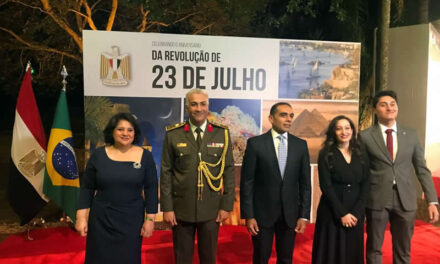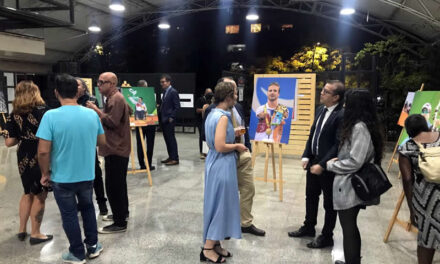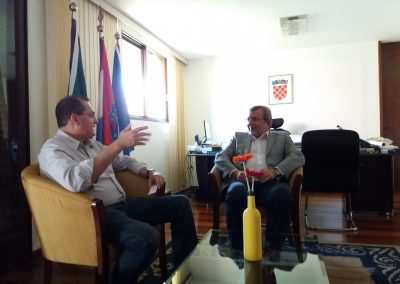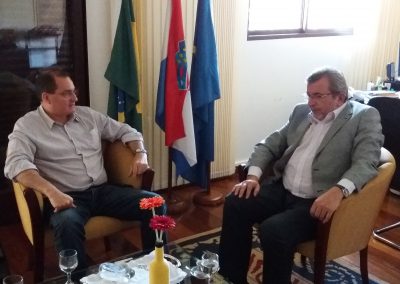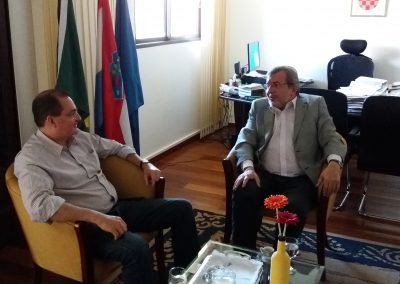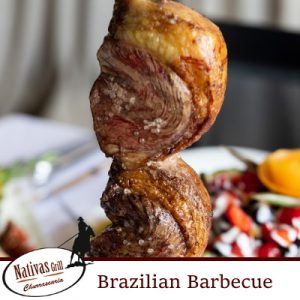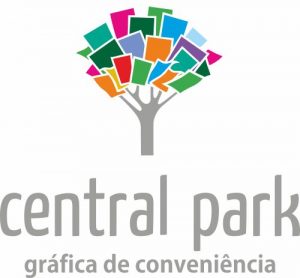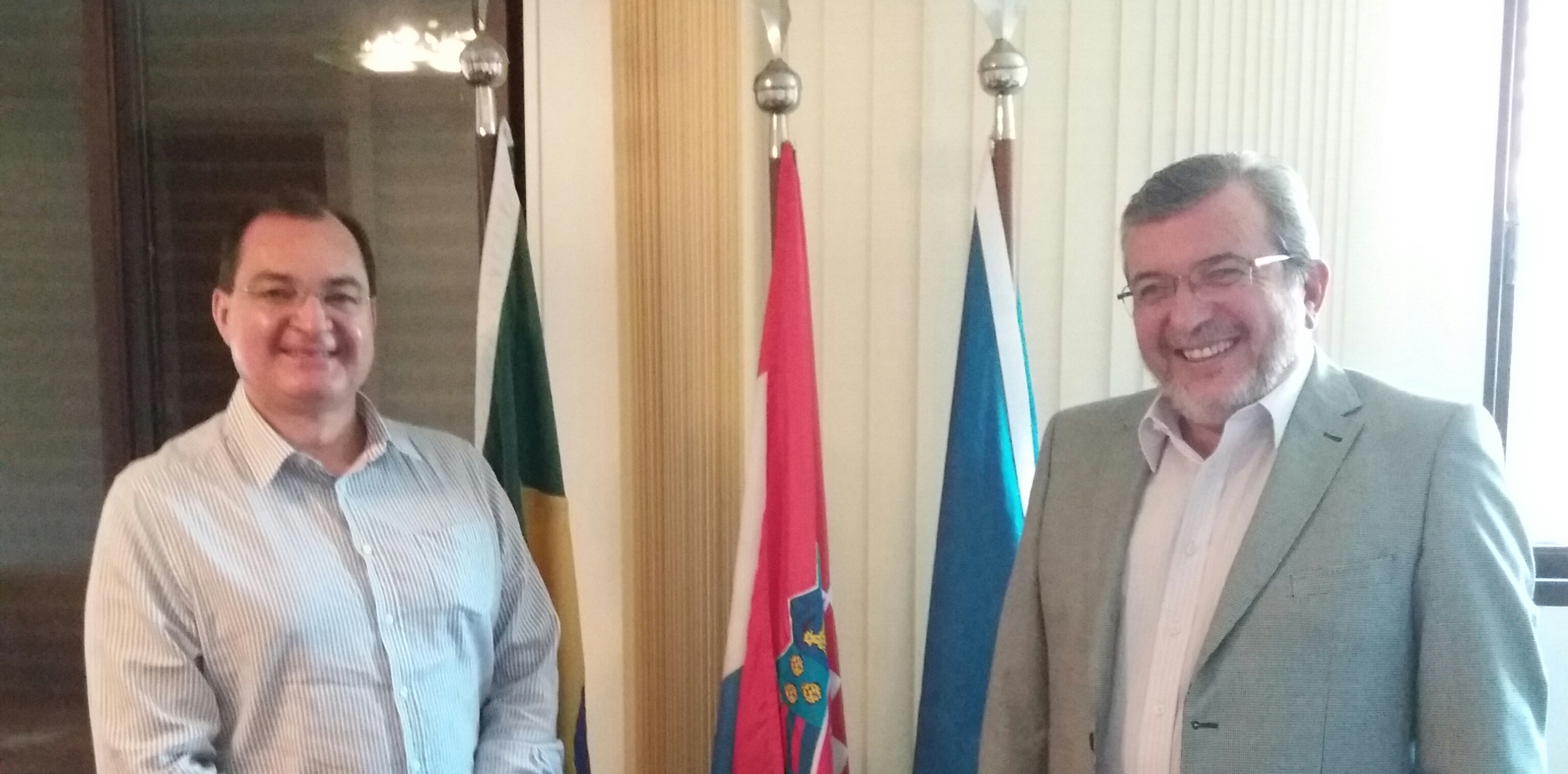
From left: Director of THE GUIDE Mr. Pedro Paulo Moreira and Ambassador of Croatia Mr. Zeljko Vukosav
The Croatian national football team was recently runners-up of the 2018 FIFA World Cup. This represents the greatest achievement in the history of the Croatian football squad. To celebrate the occasion, the Executive Director of THE GUIDE Mr. Pedro Paulo Moreira interviewed the Ambassador of Croatia Mr. Zeljko Vukosav, at the Embassy of Croatia, located at Lago Sul, Brasília. Check out the interview below:
THE GUIDE: Croatia came in second place at the 2018 FIFA World Cup, and this was a big surprise to the world. How was this received by the Croatian people? Was it also a surprise?
Ambassador Mr. Zeljko Vukosav: Of course it was a surprise for us as well, Croatia wasn’t listed as one of the favorites to win the tournament, let alone reach the final. Although unlike many people think, this wasn’t the first time Croatia performed well against the odds. Like the British say, this achievement wasn’t “out of the blue”. Croatia beat Germany 3×0 in the 1998 FIFA World Cup quarter finals, only to be knocked out by France in the following stage. So, in a way, this final could have settled that score.
THE GUIDE: Other than football, what other sports do Croatians excel at?
Ambassador Mr. Zeljko Vukosav: Mostly team sports such as Handball, Basketball and Water Polo. We also excel in winter sports such as Skiing. The Snow Queen Trophy, akin to the Skiing World Cup, is held in Zagreb.
THE GUIDE: Your President, Mrs. Kolinda Grabar-Kitarovic, gained a lot of attention during the World Cup for her joyful personality. Is that her personal trait or is it a common characteristic of the Croatian people?
Ambassador Mr. Zeljko Vukosav: I thank you for your kind words regarding our President. The whole world commented on how she conducted herself during the World Cup. She didn’t seem like an ordinary chief of State, formal and in a way distant from regular people. Croatia is one of the main tourist sites of the Mediterranean. Last year we had 18 million tourists, which is a lot for a country with a population of a little over 4 million people. And when you ask these tourists who visit our country about their impressions of Croatian people, they’ll most likely tell you that they are very warm and receptive. So I believe it was only natural that President Kolinda behaved how she did.
THE GUIDE: Regarding politics, what type of government does Croatia have?
Ambassador Mr. Zeljko Vukosav: Croatia has a Parliamentarian government, like the majority of the countries of the European Union. Shortly after the independence, at the start of the 90’s, we started out as semi-presidentialist. But after the death of the first president, the system was changed to Parliamentarian.
THE GUIDE: Is Croatia divided by states?
Ambassador Mr. Zeljko Vukosav: Croatia is divided by districts. There are very big internal differences. The coastal part of the country has little in common with the country part. They differ vastly in culture, history, tradition, weather and culinary. The climate changes abruptly depending on the region.
THE GUIDE: You speak very good Portuguese, where did you learn the language?
Ambassador Mr. Zeljko Vukosav: I lived in Portugal before coming to Brazil.
THE GUIDE: Are you Ambassador of any other South American countries?
Ambassador Mr. Zeljko Vukosav: Yes, I am also Ambassador for Colombia and Venezuela. Brazil has roughly 20/30 thousand Croatians, mostly concentrated in São Paulo. The largest Croatian communities in South America are in Argentina (about 150 thousand) and in Chile (about 200 thousand).
THE GUIDE: What are the most traditional celebrations in Croatia? Is there any event comparable to our Carnaval?
Ambassador Mr. Zeljko Vukosav: Recently in Croatia began the “Carnaval de Samba”. It happens on an island that was once compared to Copacabana. Carnaval is also celebrated in the coastal city Rijeka. Croatia is a predominantly a Catholic country, so the celebrations are very similar to the ones performed in Brazil.
THE GUIDE: How does Croatia’s education system work?
Ambassador Mr. Zeljko Vukosav: We have primary school that lasts 8 years and is mandatory. After that there is middle school that lasts another 4 years and is not mandatory now, but it is being considered making it so. Then there is university that extends for 3 years for a bachelors degree, 2 years for a masters degree and 3 years for a doctorate degree. Over 80% of the youth is currently enrolled in either primary or secondary school. They are predominantly public schools, 90% of the school population does not pay for their education. It is very common in our country for the students to receive musical education as well.
THE GUIDE: Regarding population, would you say about half of Croatians are under the age of 40?
Ambassador Mr. Zeljko Vukosav: Something like that, but like all European countries, we have many senior citizens. We have a serious problem with migration of the youth to other European countries. As members of the European Union, they can move freely throughout the other member countries.
THE GUIDE: How are commercial relations between Croatia and Brazil?
Ambassador Mr. Zeljko Vukosav: I would like for the two countries to have a larger trade, better than the one we have now. Before the economic crisis, we secured around 270 million dollars in trades. After the crisis it plummeted to around 50 million and now it is returning to normal. For a small country like Croatia, the fiscal barriers make it very difficult to export goods. We hope that the deal between the European Union and Mercosul comes through soon. The deal is close to being finalized, negotiations have been going on for the past 20 years. It would be beneficial not only for Croatia, but for Brazil as well.
THE GUIDE: Do you enjoy living in Brasília? Are there similarities between Croatians and Brazilians?
Ambassador Mr. Zeljko Vukosav: Life in Brasília is comparable to life in Europe. Of course there are differences, but in terms of quality of life, we have great quality here. Brasília is a beautiful city, clean, everything works, and traffic isn’t as terrible as it is in other Brazilian cities. Some colleagues say that the cultural life isn’t as active as they’d like, but we have many activities amongst the Embassy community. I see many similarities between Brazilians and Croatians. Both are very warm, receptive people. I think Brazilians are even more open and friendly, but it is something we have in common.
THE GUIDE: Ambassador, we thank you for your hospitality in welcoming us to this interview and we would like to congratulate you and your country for the wonderful World Cup campaign.
Ambassador Mr. Zeljko Vukosav: Thank you very much. It was a pleasure to have your visit at the Croatian Embassy.

